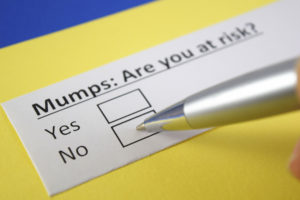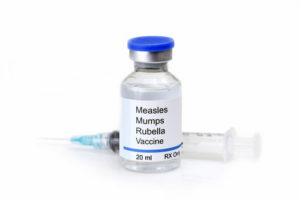Back to Main Page
Mumps is a contagious viral infection that usually affects children. In recent years there has been an increase in the number of cases of 15-34 year olds contracting the virus due to the amount of people who have not been previously vaccinated for mumps or have had only one dose of the vaccination (HSE, 2016).
How do Mumps Spread?
 Mumps are spread via kissing, sneezing or coughing where the tiny droplets that contain the mumps virus are released into the air and can be inhaled by others. They can also be spread through indirect contact where the tiny droplets that contain the virus are on an object such as doors handles etc.
Mumps are spread via kissing, sneezing or coughing where the tiny droplets that contain the mumps virus are released into the air and can be inhaled by others. They can also be spread through indirect contact where the tiny droplets that contain the virus are on an object such as doors handles etc.
Those who are infected will be very highly contagious 1-2 days before the symptoms begin to appear and for 5 days afterwards. During this period you should be cautious of spreading the infection to others, in particular those at risk of developing further complications such as teens and adults who have not been vaccinated, and pregnant women (HSE, 2016).
Symptoms of the Mumps
Symptoms usually develop between 14-25 days after the person has been infected. A swelling of the parotid gland is the most common symptom of the mumps. This is the gland on both sides of your face, under your ears that produces saliva. There will be pain in the glands, and difficulty and pain when swallowing. Further symptoms of mumps include:
- Headaches,
- Pain in joints,

- Nausea/Fatigue,
- Loss of appetite,
- High temperature,
- Inflammation in the ovaries or testicles,
- A dryness in the mouth.
The Complications of getting Mumps
For children who get mumps, the consequences are minimal as symptoms can pass within two weeks and in general do not cause any long term health issues. Teenagers and adults who contract mumps have a much higher risk of developing serious complications including the following;
- Painful swelling of the testicles,
- Inflammation of the ovaries and/or breast tissue,
- Swelling of the brain or viral meningitis.
- Deafness.
Vaccinations
In the interest of the Health and Safety of all who work and study in the Institute we recommend that students have had all their routine childhood vaccinations/immunisations before registration. These vaccinations include Diphtheria, Tetanus, Whooping Cough (Pertusus), Hib Haemophilus influenzae, Polio, Meningitis C, MMR (Measles, Mumps, Rubella). Please check your family records and consult your GP for information and advice.
Students who are undertaking specific science and social studies courses where there may be a risk of contracting Hepatitis A or Hepatitis B are advised to refer to the Institute prospectus and contact their own GP for vaccination recommendations.
We can help you
Book an appointment with the nurse at IT Sligo Health Services reception desk – Don’t forget your student ID card.
For more information; email studenthealthservices@nullitsligo.ie or contact -071 93 05463 or 071 93 05205